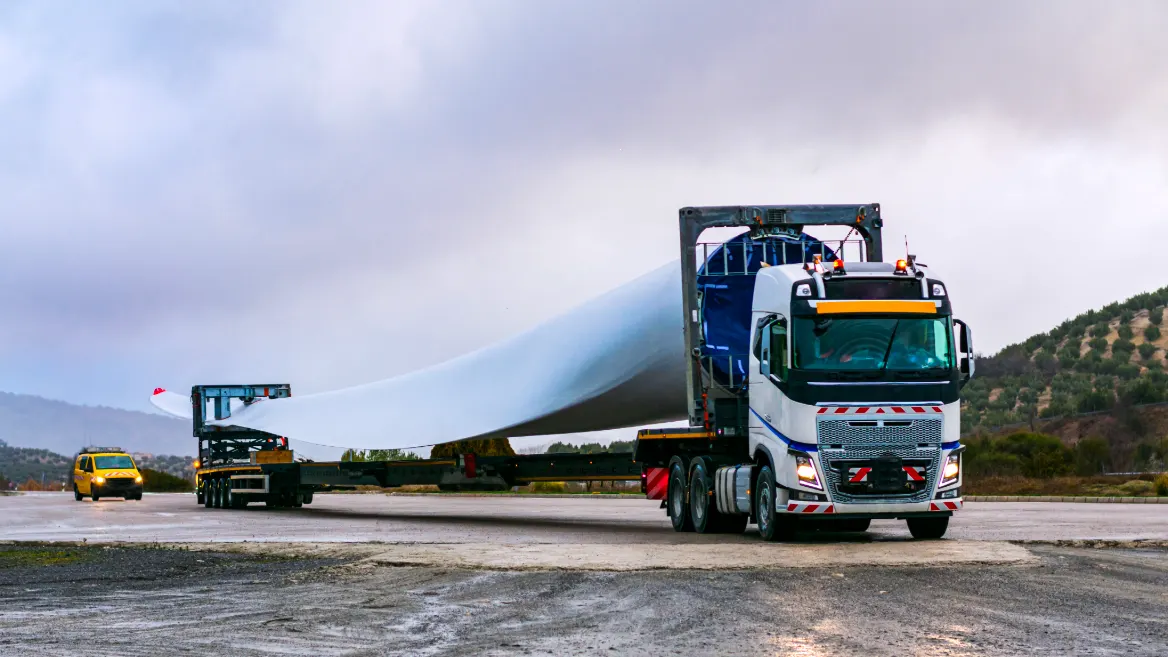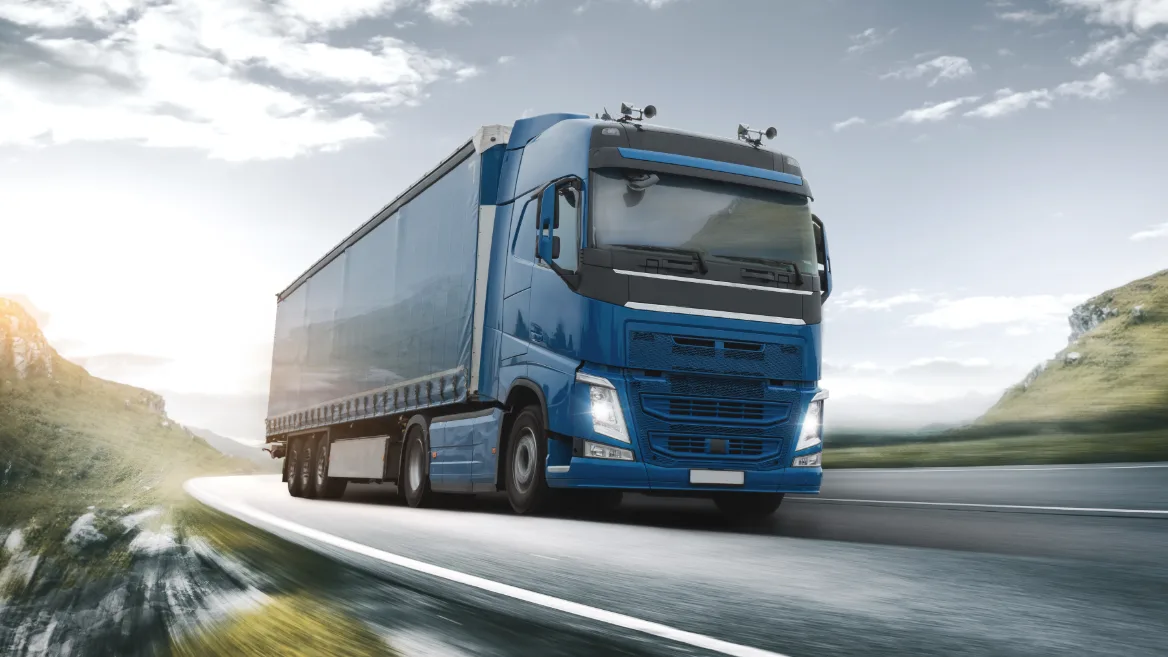Whether you’re new to the transport industry or scaling up your operations, a firm understanding of HGV insurance keeps your business legally compliant, financially protected, and ready for whatever the road throws at you.
This guide breaks down everything you need to know, from policy types to extras, legal requirements, and how to compare insurance quotes effectively.
What we’ll cover
Fleets, bookings, subcontractors, compliance & payments.
With HX, you can manage them all in one place.
What is HGV insurance?
HGV insurance is a specialist type of motor insurance designed to cover heavy goods vehicles used for commercial purposes.
It protects against damage, theft, and third-party claims, ensuring that your vehicle (and your business) is covered if something goes wrong. Without it, operating a truck or lorry commercially in the UK is illegal.
It’s not a one-size-fits-all product. Policies can be tailored to cover single vehicles, full fleets, or even temporary use. Depending on what you carry and how far you drive, your needs will probably vary.
Brokers and providers often use terms like truck insurance UK, haulage insurance, or logistics insurance to describe similar policies. While the core principles are the same, each policy comes with its own conditions, limits, and exclusions.
That’s why getting the right HGV insurance quote is so important.
Understanding HGV, truck, and lorry: Key definitions
In the UK, the terms HGV, truck, and lorry are often used interchangeably, but there are key differences:
- HGV refers to a heavy goods vehicle with a gross weight of over 3.5 tonnes.
- “Truck” is a more general term.
- “Lorry” is typically used in everyday conversation to describe larger goods vehicles in the UK.
If you’re unsure which category your vehicle falls into, you should review the official guidelines on lorry sizes and UK regulations. These standards outline the weight classes, length restrictions, and legal requirements for different vehicle types. Knowing where your vehicle stands will help you get accurate cover and stay compliant.
Most insurers will want to know the exact weight, type, and use of your vehicle before issuing a truck insurance quote.
So whether you’re operating a single lorry or managing a large haulage business with a mix of HGVs and courier vans, understanding these definitions is essential to getting the right policy.
Types of HGV insurance policies
Choosing the right type of HGV driver insurance depends on how your vehicle is used, what it carries, and your budget.
In the UK, you’ll usually pick from one of three main policy types, each with varying levels of protection. Let’s look a look:
Third-party only
Legally, this is the least amount of cover you’re allowed to operate with.
Third-party insurance protects you against damage to other people, vehicles, or property, but not your own truck. It’s typically the cheapest option, but it won’t cover cargo theft, fire, or accidental damage to your own HGV.
Third-party, fire & theft
This level includes third-party cover plus protection if your truck is stolen or damaged by fire.
It’s a popular middle-ground choice for older or less valuable vehicles. However, it still won’t cover damage to your truck in a collision you caused.
Comprehensive
Comprehensive haulage insurance covers everything in the previous tiers, plus damage to your own vehicle, even if you’re at fault.
It’s the most complete form of truck insurance in the UK, offering peace of mind in most situations. As you can imagine, this is often the preferred choice for newer or high-value trucks.
Specialised coverage options
Depending on your operation, standard haulage insurance policies might not be enough.
There are several specialised insurance options that offer more tailored protection for different setups. These include:
Fleet insurance
HGV fleet insurance covers multiple vehicles under one policy, making it easier to manage cover and potentially reduce costs.
It’s ideal for large haulage businesses with five or more trucks on the road. Fleet policies can also include mixed vehicle types and drivers.
Temporary insurance
Temporary insurance is useful for short-term cover, and perfect for borrowed vehicles, seasonal work, or short contracts.
You can often get this type of truck insurance online for durations ranging from one day to a few months. It’s flexible and typically cheaper than changing your existing policy.
Telematics insurance
Some insurers offer telematics or “black box” insurance for trucks, using GPS tracking to monitor driving behaviour.
This can lead to lower HGV insurance costs for safe drivers and improved risk management across your fleet. It’s also useful for businesses looking to improve efficiency and reduce incidents.

Optional extras
When getting an HGV insurance quote, it’s also worth considering add-ons that can give you fuller protection.
These extras vary by provider but can make a big difference in case of an emergency. They include:
- Breakdown cover: A must if your truck travels long distances or works overnight. It ensures fast roadside support, minimising delays and loss of earnings.
- Legal expenses: Covers legal costs related to accidents, claims disputes, or licence issues. Handy for operators who want peace of mind without hefty legal fees.
- Goods in transit: Essential if you’re carrying customer freight. It covers damage, loss, or theft of cargo while in your vehicle. Many haulage contractor insurance policies include this as standard.
You might also want to look at haulage goods in transit insurance or light haulage insurance if your operation deals with fragile or high-value goods.
Extras like courtesy vehicles and replacement driver cover are available too. We’d recommend thinking about your risks and day-to-day operations before deciding.
If your business handles sensitive client data or uses digital systems for load bookings and route planning, you should also consider haulage cyber insurance to protect against online threats and data breaches.
Legal and regulatory requirements
To operate legally, all HGV owners must meet a few key requirements. Here’s what you need to know:
- Minimum insurance is a legal must: Every HGV on UK roads must be covered by at least third-party HGV insurance. This applies to solo drivers, those running a small haulage business, and larger companies alike. Driving without proper insurance can result in fines, licence penalties, or even vehicle seizure.
- Drivers need the correct qualifications: All drivers must hold a valid HGV licence appropriate to their vehicle’s class. If you’re just starting out or planning to expand your team, make sure drivers have up-to-date truck driver CPC training and medicals. Unlicensed or improperly trained drivers could invalidate your cover.
- Operator licence and business records must be current: If you operate commercially, you’ll likely need an operator licence. While some may search for HGV insurance without operators licence, this is usually only applicable for non-operational or stored vehicles. Staying compliant includes record-keeping, vehicle maintenance logs, and proper documentation at all times.
For better peace of mind, working with an experienced provider like Business Choice Direct ensures your cover is both compliant and tailored to your needs. They understand the unique risks involved in haulage and logistics, helping you avoid gaps in protection. Whether you’re launching or scaling, their support can be invaluable.
Factors influencing premiums and costs
When calculating your HGV insurance cost, insurers consider several factors.
The type of goods you carry, your mileage, and your claims history all play a part. Your vehicle’s value, age, and security setup also affect your premium.
Business size matters, too. A haulage fleet insurance policy might come with discounts, while a private HGV insurance policy for a single truck may have fewer variables. The driver’s age, experience, and endorsements are equally important.
If you’re new to the industry, expect higher premiums at first. As you build up a clean record, your costs may drop over time.
Still wondering how much HGV insurance is in the UK? Rates vary widely, so it’s best to get multiple quotes tailored to your setup.
How to shop and compare HGV insurance policies
The best way to find the right deal is to compare HGV insurance policies across a range of providers.
Look beyond price, making sure to check what’s included, what’s excluded, and whether extras are optional or built-in. A cheap quote isn’t always the best value if you’re left underinsured.
Using HGV insurance brokers can save you time and help you find niche coverage. They often have access to policies that aren’t listed through comparison tools. For specific jobs (like heavy haulage insurance or road haulage insurance) a broker might get you better terms.
Whether you’re getting a truck insurance quote for the first time or renewing an existing policy, go in with clear requirements. Look at excesses, cover limits, and cancellation fees.
And always read the fine print, especially if you’re buying truck insurance online.
HGV insurance FAQs
How much is insurance for an HGV?
The cost of HGV insurance depends on several factors including your vehicle type, driving history, and the nature of your work. For new operators, prices can start from around £1,500 annually but can vary widely depending on risk and coverage. It’s always best to get a tailored insurance quote from a trusted provider or broker.
Can HGV drivers get cheaper insurance?
In some cases, yes, especially if they have a clean licence, long experience, and no recent claims. Experienced HGV driver insurance tends to be lower than for someone new to haulage. Taking steps like extra training and using telematics can also reduce premiums.
Why is truck insurance more expensive?
Truck insurance cost is higher because the vehicles are large, expensive, and often used for commercial purposes. They also pose more risk on the road and carry valuable or high-risk freight. Specialist cover like haulage insurance or haulage fleet insurance adds protection but also increases the price.




